Egypt

THE DISSENTERS is a powerful literary portrait — part love story, part elegy, part testimony to Egypt’s shifting soul over seven decades. At its center is one woman, Amna Abu Zahra, fractured into three identities: Amna, the girl chasing autonomy and education; Nimo the striving student and journalist; and Mouna, the wife of a socialist husband, reimagined not as “mama” but as a woman seeking love on her own terms.
Told through a series of letters from Amna’s son Nour, a newly divorced father, to his sister Shimo, a Stanford doctoral student in California, the novel dissects their mother’s life with aching intimacy. As Amna asks, “What have I done?” her son seeks to understand, “Who am I?” — a question inseparable from his mother’s story.
The gripping and vivid narrative is nonlinear. Though fictional, it felt real, evocative of the Egypt my immigrant father left and loved. But unlike the memories he shared with me, this is the story of a woman who tried to live unapologetically, only to be let down by love, religion, and society. The book reflects her internal chaos as she endures arranged marriage, female genital mutilation, betrayal, the failure of men to lead, and society’s refusal to enact change.
Amna’s journey crosses sharp political and emotional terrain: the collapse of Arab nationalist president Gamal Abdel Nasser’s socialist dream in 1970, Anwar Sadat’s conformist middle class in the ’70s, and the enduring grip of military authoritarianism under current president Abdel Fattah El Sisi. Religion becomes both a rebellion against Nasser’s socialism and resignation to Sadat’s religious convictions — a phase of strict piety driven by longing for meaning and the hope that faith can absolve even the sins she doesn’t regret.

Our Lord Jesus Christ could often be found on a mountain. He went to a mountain to pray, to seek solitude from the crowds. He fasted and prayed for 40 days and 40 nights on the mountain where the devil tempted him. He met Moses and Elijah on Mount Tabor and was transfigured before his disciples. His most famous sermon is the Sermon on the Mount.
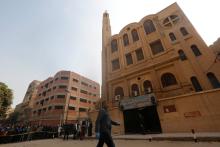
The incident took place just days after attacks on a Coptic church and another Christian-owned shop also south of the Egyptian capital that killed more than 10 people, as security forces braced for attacks against the Arab world's largest Christian minority ahead of Orthodox Christmas celebrations.
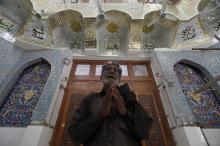
Many Muslims and non-Muslims around the globe celebrate Sufi saints and gather together for worship in their shrines. Such practices, however, do not conform to the Islamic ideologies of intolerant revivalist groups such as Islamic State. On the contrary, IS finds these practices threatening. Here’s why.
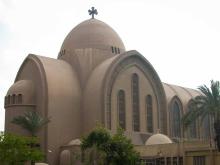
The 2,000-year-old Coptic Church of Egypt has a long tradition of hallowing those who died affirming their faith in the face of violence.
But the group that calls itself the Islamic State has launched waves of attacks on the Coptic community in recent years – claiming at least 70 lives and wounding scores of others – an unrelenting assault that has opened a debate in the community about martyrdom.

In Egypt, religious identity is stated on each resident's identification card. Egyptian names often reflect religious affiliation, and many Christians have Coptic crosses tattooed on their wrists. These cultural norms were practice before the increase in violence, but the introduction of rigorous screenings, checkpoints, and religious “profiling” has made these differences more acute.
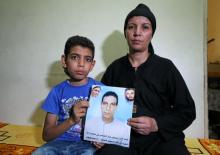
Egyptian schoolboy Mina Habib rarely leaves his house these days. The 10-year-old is still recovering from seeing Islamist gunmen kill his father for being Christian. In an attack claimed by Islamic State, gunmen ambushed a group of Coptic Christians traveling to a monastery in Minya in southern Egypt last month, killing 29 and wounding 24, with Mina's father Adel among the dead.
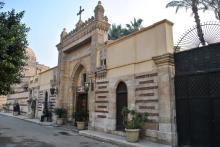
This is one of numerous attacks on Coptic Christians this year. Christians have repeatedly been targeted and attacked by members of the Islamic State, who have vowed to carry out more attacks in the future.
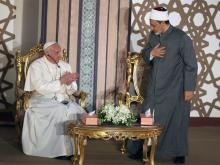
The global growth of Islam, and in particular the rise of Islamic extremism, have forced recent popes to set out, with increasing urgency, a strategy for engaging the religion.

Pope Francis, starting a two-day visit to Egypt, urged Muslim leaders on Friday to unite in renouncing religious extremism at a time when Islamist militants are targeting ancient Christian communities across the Middle East. Francis's trip, aimed at improving Christian-Muslim ties, comes just three weeks after Islamic State suicide bombers killed at least 45 people in two Egyptian churches.

Pope Francis flies to Cairo on Friday, less than a month after church bombings killed 45 people in two Egyptian cities as part of a concerted campaign by Islamist militants to rid the Middle East of Christians. Home to some of the faith's earliest churches, the region's Christian communities have been in decline for decades, but wars this century in Iraq and Syria, and the emergence of Islamic State have put their future in doubt.

Copts are the largest minority population in the Middle East and make up 10 percent to 15 percent of Egypt’s population. Founded in the first century by St. Mark the Apostle, it is believed to be one of the oldest Christian denominations in the world.
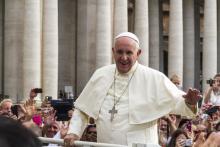
Archbishop Angelo Becciu, the Vatican deputy secretary of state, told Italy's Corriere della Sera newspaper that the events on Sunday, however tragic, "could not impede the pope from carrying out his mission of peace."

It was her desire to hear the stories of real people — “not just faceless refugees or immigrants” — that brought the Rev. Elizabeth A. Eaton to a refugee resettlement agency that provides a range of services to refugees in the Chicago area.
“Especially now, when there’s this fear that’s been stirred up, and anti-refugee sentiment, it’s really critical to say, ‘No, these people are our grandparents, our aunts and uncles,” said the presiding bishop of the Evangelical Lutheran Church in America, the nation’s largest Lutheran denomination.

“It is a thinly-veiled reference to stereotypes about Islam and Muslims,” said Daniel Mach, director of the American Civil Liberties Union’s Program on Freedom of Religion and Belief. “This reference to honor killings is part of a broader effort to smear an entire faith by the extreme acts of a few and its inclusion in this order bolsters the argument that this is simply another attempt at a Muslim ban.”

Safety is defined in the nineteenth chapter of Leviticus as abiding in God’s sense of justice —“not be partial to the poor or defer to the great: with justice you shall judge your neighbor.” Justice is love and love is behaving out of fairness to all — even those we see as a risk. We cannot expect to be in safety unless we treat others as we wish them to treat us.

When President Obama signed a newly strengthened international religious freedom act on Dec. 16, the intention was to protect religious believers around the world.
But the freshly signed act is being heralded by some legal scholars as a different milestone — for the first time, atheists and other nonreligious persons are explicitly named as a class protected by the law.

As Pope Francis officially opened this year’s Christmas Nativity scene in St. Peter’s Square, he said Jesus was a “migrant” who reminds us of the plight of today’s refugees.
Francis told donors who contributed both the Nativity set and an 82-foot tree that the story of Jesus’ birth echoes the “tragic reality of migrants, on boats, making their way toward Italy,” from the Middle East and Africa today.
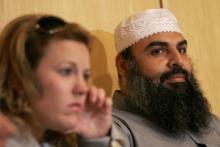
Italy must pay compensation to an Egyptian imam’s family after a European court ruled his human rights had been breached in a C.I.A. operation that had him abducted in Milan and sent to his country of birth where he was tortured. The European Court of Human Rights ordered Italy to pay a total of 115,000 euros ($126,500) in damages and legal expenses to Hassan Mustafa Osama Nasr and his family.
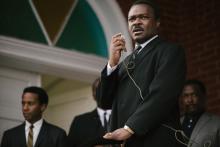
Here is one of 2014’s most enduring tips for budding filmmakers: Do not make films that are going to make developing countries angry.
First, North Korea went ballistic over “The Interview,” which contained a farcical plot to assassinate Kim Jong Un. And then, Egypt, Morocco, and the United Arab Emirates decided to ban the new Ridley Scott biblical epic, “Exodus: Gods And Kings.”
Why? Egypt, in particular, is angry at the film’s historical inaccuracies. “Exodus” shows the ancient Egyptians hanging recalcitrant Hebrew slaves; hanging was never used as a punishment in ancient Egypt. Moreover, the Egyptians are upset because the film depicts the ancient Hebrews laboring on the Great Sphinx and the pyramids. They also object to the depiction of an armed Hebrew insurrection, which does not appear in the ancient biblical text.
The official statement claimed the film includes “intentional gross historical fallacies that offend Egypt and its pharaonic ancient history in yet another attempt to Judaize Egyptian civilization, which confirms the international Zionist fingerprints all over the film.”
Guess what? The Egyptians are right.